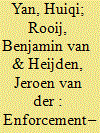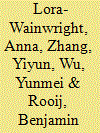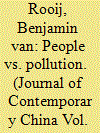| Srl | Item |
| 1 |
ID:
155664


|
|
|
|
|
| Summary/Abstract |
This article analyses centralizing trends that may be able to reduce the negative influence of local protectionism on environmental law enforcement in China. The article finds that as centralizing trends unfolded, enforcement over time has become stricter and more frequent, however with only minor effects in reducing pollution. Moreover it finds a situation of uneven enforcement with richer and more urbanized areas having much stronger and more frequent enforcement than inland areas. Centralizing trends may thus have spurred stronger enforcement, but concurrently allowed for an uneven enforcement. At the same time, the article finds a continued local influence, keeping enforcement too weak to have much effect in reducing pollution and allowing for local interests to shape enforcement into unequal outcomes.
|
|
|
|
|
|
|
|
|
|
|
|
|
|
|
|
| 2 |
ID:
146891


|
|
|
|
|
| Summary/Abstract |
This article, in a study of amoral cost–benefit analysis, legitimacy and capacity to obey the law, seeks to understand why Chinese farmers obey or break pesticide rules. It uses data gathered through intensive fieldwork at a local level, including interviews with 31 pesticide experts and officials and 119 vegetable farmers in central China. It uncovers an enforcement–compliance paradox: a situation where law enforcement concentrates exactly on those rules that are least likely to be broken and on those regulated actors who are most likely to comply. It finds two explanations. First, enforcement policy simply may not be aware of which rules are more likely to be complied with and which regulated actors are more likely to comply even when there is limited deterrence. Second, technocratic risk-averse enforcement policy may be oriented towards those rules and actors for which violation – theoretically – results in the greatest damage, not towards those rules that are more likely to be broken and those actors who are more likely to break them.
|
|
|
|
|
|
|
|
|
|
|
|
|
|
|
|
| 3 |
ID:
113931


|
|
|
|
|
| Publication |
2012.
|
| Summary/Abstract |
It is often assumed that, when citizens do not oppose pollution, it is due to their ignorance of its effects or to structural barriers to change. This article argues that a sense that pollution is inevitable is also a major obstacle. We outline the gradual formation of environmental subjects who have learnt to value their environment in ways consonant with the seemingly inevitable presence of pollution. We argue that perceptions of inevitability were produced by: (1) the subordination of villagers to their leaders and the dependence of both on local industries; (2) experiences with protests; and (3) the framing of the exploitation of local resources as part of a broader national project of development. This study sheds light on the study of environmental protests in China by illustrating how parameters for contention come into being and how they are intertwined with the governance of the village and of the environment.
|
|
|
|
|
|
|
|
|
|
|
|
|
|
|
|
| 4 |
ID:
095827


|
|
|
|
|
| Publication |
2010.
|
| Summary/Abstract |
Chinese pollution victims have increasingly started to resort to political and legal action to protect their interests. This paper analyzes such activism by studying how citizens identify the necessity to initiate action against pollution and by investigating the obstacles they meet when attempting to take action. The paper highlights the importance of state and intermediary institutions to aid citizens in understanding the seriousness of pollution and overcoming the obstacles they face. It shows, however, that often such aid is not available, and that state institutions when aligned with industrial interests restrict rather than support citizen action. When this occurs, citizen activism becomes an isolated affair, resulting in adversarial relations with state and industry, sometimes escalating to violence and repression of activists. The paper concludes that isolated activism forces a new look at concepts such as 'embeddedness' and 'rightful resistance' to capture citizen activism and contentious politics in China.
|
|
|
|
|
|
|
|
|
|
|
|
|
|
|
|